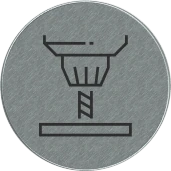
DIMENSIONAL INSPECTION
Steel Lavorazioni Meccaniche specializes in various types of mechanical machining, where dimensional inspection serves as the final certification stage of the production process.
The technical excellence of Steel Lavorazioni Meccaniche
Steel Lavorazioni Meccaniche performs dimensional inspections using a comprehensive range of advanced instruments, ensuring that every component meets the required specifications.
Each inspection process is carried out in compliance with international standards such as ISO 10012 and ISO 14253, guaranteeing maximum precision and quality at every stage of production.
With over 30 years of experience, the company reliably meets the needs of highly demanding industries, delivering products that strictly adhere to required tolerances. The combination of experience, innovation, and meticulous attention to detail makes Steel Lavorazioni Meccanichea trusted partner for those seeking exceptional results while ensuring compliance with the most rigorous industrial standards.
WHAT IS DIMENSIONAL INSPECTION?
Dimensional inspection is a crucial part of quality control in manufacturing. This process ensures that dimensions and geometric tolerances are within the required specifications, identifying any defects or deviations from the original design.
Dimensional inspection can be performed at different stages of production, including prototyping, machining, and final product verification.
The primary goal of dimensional inspection is to confirm that manufactured components accurately match the design specifications in terms of shape, dimensions, and geometry.
Industries Where Dimensional Inspection Is Essential:
Dimensional accuracy is critical in these industries, making dimensional inspection an essential step in any precision machining process.
TYPES OF DIMENSIONAL INSPECTION
There are different types of dimensional inspection, with a key distinction between in-line inspection and laboratory inspection.
In-line dimensional inspection allows for real-time product evaluation during the production cycle. This method analyzes the entire production process, not just individual components.
Laboratory dimensional inspection is more complex and precise, utilizing high-accuracy systems to ensure reliable results. This method is typically required by industries that demand meticulous and detailed analyseson products that undergo high-precision machining.
Regardless of the chosen method, both must be performed with the highest levels of precision and reliability.
Another key variation in dimensional inspection depends on the scanning method, which can be:
Point-to-point scanning: The fastest method, suitable for wider tolerance ranges or products with fewer surface irregularities.
Continuous
Continuous scanning: Takes longer but provides higher accuracy, as it detects a greater number of surface anomalies compared to point-to-point scanning.
COMPONENTS AND FUNCTIONING OF DIMENSIONAL INSPECTION
Dimensional inspection involves the use of various measurement tools, depending on the type of component being analyzed. The most commonly used instruments include
All dimensional inspection tests must be conducted in accordance with international standards, including: ISO 10012, ISO 14253 and ASTM E18.
These machines use a computer-controlled mechanical arm to measure an object’s X, Y, and Z coordinates. The part is placed on the CMM work platform, and the arm moves along three axes to take precise dimensional measurements.
These are designed to measure the dimensions of complex objects, such as curved surfaces, grooves, or holes. The sample is placed on an illuminated table, and a magnifying lens projects an enlarged image onto a graduated screen for measurement.
These devices detect nearly all surface defects with high precision. Advanced analysis softwarecompares the scanned 3D model with the original CAD design, highlighting excess material, missing sections, or out-of-tolerance dimensions for engravings, recesses, and holes.
A non-destructive inspection method using X-ray technology, ICT provides dimensional data for internal cavities and hidden features of the analyzed component. This technique is particularly useful for verifying the conformity of parts containing housings, fittings, or enclosed cavities.
Other commonly used manual measurement tools include protractors, micrometers, and calipers.
ADVANTAGES OF DIMENSIONAL INSPECTION
Errors occurring during the production cycle or caused by human oversight can pose a serious risk to a company’s productivity. Such errors may lead to non-compliant products, which could be rejected, negatively impacting revenue and operational efficiency.
Dimensional inspection eliminates these risks by ensuring high-quality manufacturing standards while maintaining optimal productivity levels.
Key Benefits of Dimensional Inspection:
WHY CHOOSE STEEL LAVORAZIONI MECCANICHE FOR DIMENSIONAL INSPECTION?
For over 30 years, Steel Lavorazioni Meccaniche has provided its customers with cutting-edge expertise and advanced technology to manufacture high-precision mechanical components through specialized machining and dimensional inspection processes.
The company offers a comprehensive service, built on extensive experience in dimensional inspection and precision machining.
Its diverse client portfolio has allowed the company to develop a multi-industry approach, gaining solid expertise in processing a wide variety of materials and building strong capabilities in producing high-performance components.
Steel Lavorazioni Meccaniche serves key industries such as aerospace, food processing, automation, packaging, recycling, and nuclear energy, ensuring:
The company is certified to meet the stringent standards required by the aerospace, military, and nuclear industries, guaranteeing top-tier quality and reliability.
All of this makes Steel Lavorazioni Meccaniche a leading company in the industry and the ideal partner for any industrial business in need of specialized dimensional inspection services
